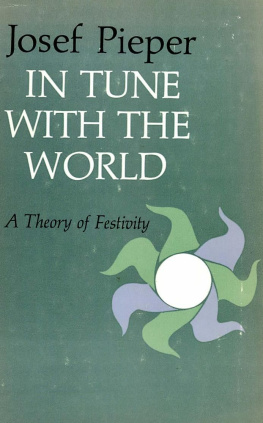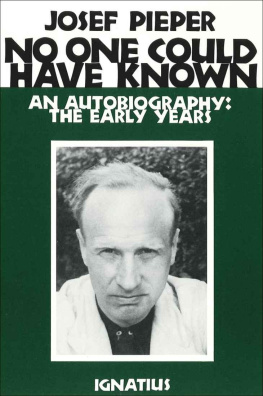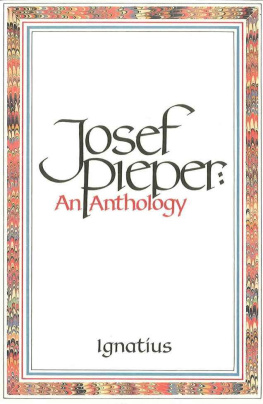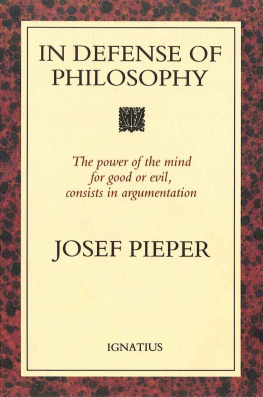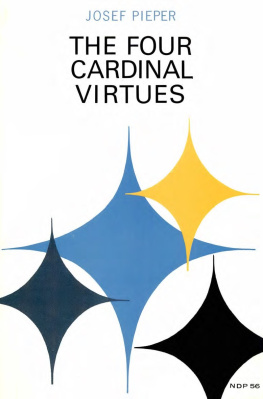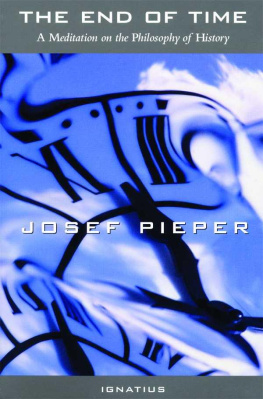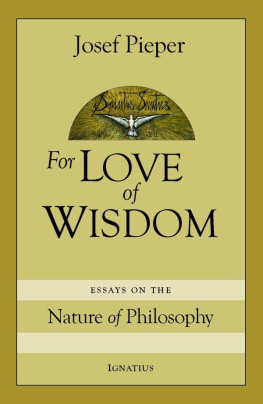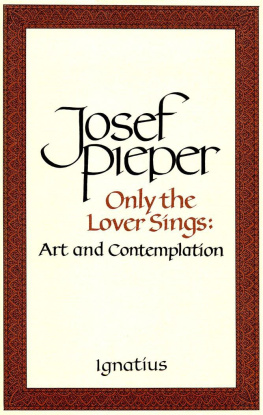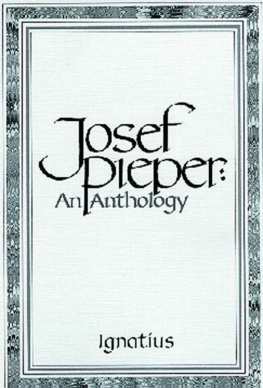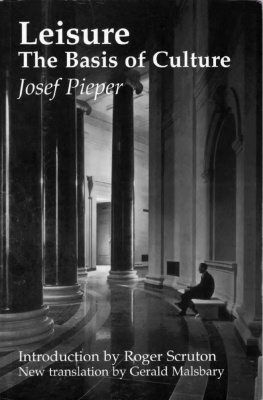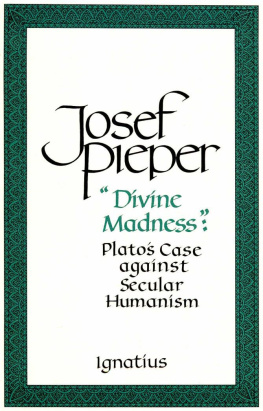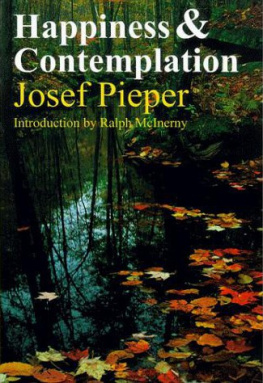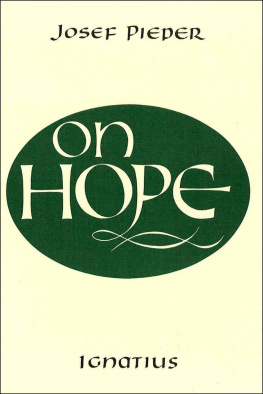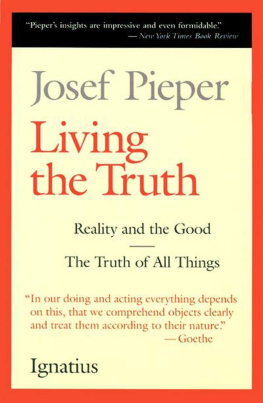Josef Pieper - In Tune With The World
Here you can read online Josef Pieper - In Tune With The World full text of the book (entire story) in english for free. Download pdf and epub, get meaning, cover and reviews about this ebook. year: 1999, publisher: St. Augustines Press, genre: Science. Description of the work, (preface) as well as reviews are available. Best literature library LitArk.com created for fans of good reading and offers a wide selection of genres:
Romance novel
Science fiction
Adventure
Detective
Science
History
Home and family
Prose
Art
Politics
Computer
Non-fiction
Religion
Business
Children
Humor
Choose a favorite category and find really read worthwhile books. Enjoy immersion in the world of imagination, feel the emotions of the characters or learn something new for yourself, make an fascinating discovery.
- Book:In Tune With The World
- Author:
- Publisher:St. Augustines Press
- Genre:
- Year:1999
- Rating:3 / 5
- Favourites:Add to favourites
- Your mark:
- 60
- 1
- 2
- 3
- 4
- 5
In Tune With The World: summary, description and annotation
We offer to read an annotation, description, summary or preface (depends on what the author of the book "In Tune With The World" wrote himself). If you haven't found the necessary information about the book — write in the comments, we will try to find it.
Pieper exposes the pseudo-festivals, in their harmless and their sinister forms: traditional feasts contaminated by commercialism; artificial holidays created in the interest of merchandisers; holidays by coercion, decreed by dictators the world over; festivals as military demonstrations; holidays empty of significance. And lastly we are given the apocalyptic vision of a nihilistic world which would seek its release not in festivities but in destruction.
Formulated with Piepers customary clarity and elegance, enhanced by brilliantly chosen quotations, this is an illuminating contribution to the understanding of traditional and contemporary experience.
In Tune With The World — read online for free the complete book (whole text) full work
Below is the text of the book, divided by pages. System saving the place of the last page read, allows you to conveniently read the book "In Tune With The World" online for free, without having to search again every time where you left off. Put a bookmark, and you can go to the page where you finished reading at any time.
Font size:
Interval:
Bookmark:

Photograph by Wnlther, Mnster
Born in 1904, Josef Pieper studied philosophy, law, and sociology, and has been a member of the faculty at the University of Mnster since 1946. Dr. Pieper has lectured widely at American universities; in 1962, he traveled to India for a lecture tour, and in 1963 to Japan. He is the author of Leisure the Basis of Culture, Belief and Faith, Scholasticism, A Guide to Thomas Aquinas, Enthusiasm and Divine Madness, and The Four Cardinal Virtues: Prudence, Justice, Fortitude, Temperance. T. S. Eliot said of him: "His sentences are admirably constructed, his ideas expressed with the maximum clarity. But his mind is submissive to what he believes to be the great, the main tradition of European thought.... He restores to their position in philosophy what common sense obstinately tells us ought to be found there: insight and wisdom." JACKET DESIGN BY ELLEN RASKININ TUNE WITH THE WORLD
BY THE SAME AUTHOR The End of Time Fortitude and Temperance Happiness and Contemplation Leisure the Basis of Culture Scholasticism The Silence of St. Thomas Guide to Thomas Aquinas Belief and Faith Enthusiasm and Divine Madness The Four Cardinal VirtuesJOSEF PIEPER
In Tune With the World
A THEORY OF FESTIVITY
Translated from the German by Richard and Clara Winston
A HELEN AND KURT WOLFF BOOK HARCOURT, BRACE & WORLD, INC. jIIi NEW YORK
Copyright 1963 by Kosel-Verlag KG, Mnchen English translation 1965 by Harcourt, Brace & World, Inc. All rights reserved. No part of this book may be reproduced in any form or by any mechanical means, including duplicating machine and tape recorder, without permission in writing from the publisher. First edition
Originally published in Germany under the title Zustimmung zur Welt by Ksel-Verlag Mnchen Library of Congress Catalog Card Number: 65-21033 Printed in the United States of America
Acknowledgment is made for permission to use quotations from stanzas VI and VII from "Bread and Wine" in Hlderlin Poems translated by Michael Hamburger, The Harvill Press Ltd., London.
CONTENTS
I
The subject of festivity involves the whole of existence. The exception inserted into workaday life. Meaningful work presupposes full knowledge and acceptance of reality. Just punishment. The festival: "something different, for a change." Free activity. Work and play. What is an act that is meaningful in itself?II
The trick of finding people who really are able to rejoice. What is the meaning of "having a good time"? Seeing as a form of fulfillment. Visio beatifica. The factor of contemplation. Sacrifice of the yield of work. Festivity as an aspect of wealth. The root is love.III
Day of rejoicing. Receiving what is loved. Everything that is, is good. Hidden assent and refusal of assent. The latent everlasting festival. The origin of festivals: praise of God in public worship.IV
There are worldly but no profane festivals. The festival as traditum. The relation of festival to ritual. Affirmation as the fundamental form of Christian worship: Amen, Alleluia, eucharistia. The fruit of festivity is pure gift. "Well-wishing" on a festival. Rapture: escape from the here and now.V
The outward aspect of festivity. Sunday and Easter: the fundamental forms of the Christian holiday. Sabbath and Sunday. The inescapable involvement in theological controversy. The Seventh Day: celebration of the gift of being created and image of the coming age. Easter, "the" festival of the Church. "We have unending holiday."VI
Festivals and the fine arts. Both have an "insular" character. The realization of festivity in the medium of the arts. The place of art is in the festival. Affirmation as the foundation of all arts. "C'est I'amour qui chante." The origin of language in festival. Posie noire. Pseudo-art and pseudo-festivity. What is a "period of dearth"?VII
Corruption of traditional festivals by commercialism. Artificial holidays established by men. "The day the Lord has made." Festivals of the French Revolution. Direct repression of religious holidays. Coerciveness and manipulated rejoicing. Unreality and boredom. Tragic operetta. The people as object of the celebration. The legislator as a "priest of social felicity."VIII
Historical origin of the socialist May Day celebration. Day of rest and strikes. Rejection of traditional festivals as bourgeois institutions. The first of May under the dictatorship of the proletariat: a "holiday of voluntary work" (Maxim Gorky). Labor army and labor deserters. The crucial factor: the complete subservience of men. Demonstration of military power. Approximation to antifestival.IX
War the modern equivalent of festivals? "Strike in the realm of the mind" (Teilhard de Chardin). The impregnable Goodness of being. Renouncing the evasions of euphemism and slander. Modern nihilism. Poetry, love, the experience of death, philosophizing: indestructible modes for escaping the world of utility. The true festival is always being celebrated. The undecided situation: between everlasting festival and antifestival. NOTES INDEX OF NAMES UBI CARITAS GAUDET IBI EST FESTIVITASChrysostom
NOTE TO THE READER
The German word Fest embraces the meanings of English feast, festival, festivity, fte, holiday, and kindred notions. The German Feier (from Latin feria) also has a broad spectrum of meanings: celebration, solemnization, leisure, time after work, holiday, etc. In this translation, no attempt has been made to establish a consistent terminology based on these words; they are rendered differently in different contexts. It may, however, be helpful to the reader to realize that either Fest or Feier, or its derivatives, underlies the English variants.IN TUNE WITH THE WORLD
A THEORY OF FESTIVITY
I
Certain things can be adequately discussed only if at the same time we speak of the whole of the world and of life. If we are not ready to do that, we give up all claim to saying anything significant. Death and love are such subjects. Festivity, too, must be included in that category. This becomes apparent as soon as we try to get beyond mere description of the facts. Let us start with what lies nearest to hand. If, for example, we consider the distinction between the festive and the workaday, we soon realize that the antithesis belongs to quite a different category from, say, that of left and right, or day and night. We do not mean only that a working day and a feast day are mutually exclusive; we also mean that work is an everyday occurrence, while a feast is something special, unusual, an interruption in the ordinary passage of time. "A holiday every day" or even every other day is an idea that cannot be realized in practice; even though it may not necessarily run counter to the concept of festivity in itself, it is hardly feasible in the lives of men existing here and now. The festive quality of a holiday depends on its being exceptional. A festival can arise only out of the foundation of a life whose ordinary shape is given by the working day. An idle-rich class of do-nothings are hard put to it even to amuse themselves, let alone to celebrate a festival. The dolce vita is a desperately unfestive affair. There is, incidentally, considerable testimony that this sad truth applied also to the courtly festivals of the Baroque period, which many an innocent historian has described as highly festive occasions. The probability is that they sprang not from joy in living, but from fear, from horror vacui, because the true prerequisite for festivity was lacking at these courts. They had "no everyday life and no work, nothing but time on their hands and boredom." Incidentally, pseudo-festivals exist, as well as pseudo-work. Not all activity, not every kind of expenditure of effort and earning of money, deserves the name of work. That should be applied only to the active and usually also laborious procurement of the things that are truly useful for living. And it is a good guess that only meaningful work can provide the soil in which festivity flourishes. Perhaps both work and celebration spring from the same root, so that when the one dries up, the other withers. But of course meaningful work signifies more than the mere fact of workaday accomplishment. The implication is that man understands the work and accepts it for what it really is, namely, the "tilling of the field" which always includes both happiness and toil, satisfaction as well as sweat of the brow, joy as well as the consumption of vital energy. If one element in these pairs is suppressed, the reality of work is falsified and festivity is ruled out. We must consider this matter in more concrete terms. In a totalitarian state labor is glorified, and government propaganda romanticizes rises in the production indices as if work were itself a form of celebration. At the same time, true festivity cannot exist in such a state; the very nature of the state is against it. But the possibility of festivity is destroyed even more thoroughly by the other falsification, the view that man's daily life, taken as a whole, is nothing but vexation, meaningless bustle, deadly drudgery, in a word: an absurdity which, however, the intrepid man who wishes to surrender neither his dignity nor his clarity of vision will not simply endure in dull passivity, but will explicitly affirm and "choose," for the sake of its very absurdity. "One must imagine Sisyphus happy," says Albert Camus. the bitter bitter and the sweet sweet. To be sure, bitterness itself can contain a healing element; the good may be found in the bad, bonum in malo. This remarkable postulate holds, apparently, only in a single context. I hesitate to call it by name, because to do so will inevitably give rise to a host of misunderstandings, if not worse. I refer to the context of just punishment, and to the fact that the soundest, sanest, and most therapeutic thing a justly punished person can do is to accept his punishment as his due, and not try to falsify it by pretending that he enjoys the taste of it, or that he has chosen it. For by enduring the bitterness, the malum, he may hope that at least by his own life he is atoning for what he has done, repairing the wrong and turning evil to good; that he is restoring a balance that could not be restored in any other way. The fact is, as everyone knows, that Christendom's sacred books call work, and incidentally death also, a punishment. That is a subject too broad to discuss here. If we even attempted it, we should have to answer the question: Why has punishment been imposed, and by whom? And then we should find ourselves squarely in the heart of theology. Still, it is good to remind ourselves that such questions can be meaningfully asked, and can also be answered. And it is good for us to be leavened, now and again, by the idea that a path has already been laid down and leads away from an attitude toward work that is essentially inhuman in both its affirmative and negative aspects. The real nature of festivity, of course, is not made apparent solely by its contrast to labor. A festival is not just a day without work, of course. This must be stated, because some writers have tried to define the essence of festivity only in terms of this difference.... is really present only in religious acts in which man as creature can grasp the truly 'other' and absolutely 'new' world of the glory of God." This observation, however, indicates that we need to understand more about the dichotomy between the festive and the everyday than that they are opposites. At one point or another we must define the inner nature of this difference in positive terms. To do so, we need not immediately cross the border into theological territory, as we have done here although that border is, of course, not far away. First, it will be profitable to examine somewhat more closely the relationship of festivity to work. In doing so, we find that we can come closer to formulating the quality of a festival, and that it is more than the pause which interrupts the normal course of everyday work. To be sure, it is that too; let us remember that Plato calls the religious holiday a breathing spell, anpaula. A day off from work, a day free from the necessity of earning one's livelihood, is after all essential to a festival; in other words, a day free of servile work. Quite understandably, that adjective servile brings us up short. Yet concealed behind it is an insight indispensable to our grasping the essence of festivity. It must be noted in passing that the underlying concept of artes serviles originally carried no slightest implication of contempt. Rather, the term referred only to activity serving a purpose outside itself (our corresponding adjective would be "useful" or "utilitarian"). But quite aside from the connotation of the term, servile work is by nature dependent on something else. It cannot be thought of apart from its purpose. As a concept, it is part of a system of ideas, and we can scarcely consider it without considering its co-ordinate counterpart. That counterpart is not inactivity or nonwork, but free activity, ars liberalis: work that does not have a purpose outside itself, that is meaningful in itself, and for that very reason is neither useful in the strict sense, nor servile or serviceable. At this point we can grasp the very tip, at least, of that hidden insight. Far be it from us to suggest that activity that is meaningful in itself is synonymous with festivity. But we have, it would seem, discovered a crucial component of festivity. To celebrate a festival means to do something which is in no way tied to other goals, which has been removed from all "so that" and "in order to." True festivity cannot be imagined as residing anywhere but in the realm of activity that is meaningful in itself. The further implication is, then, that anyone who is at a loss to say what activity that is meaningful in itself is will also be at a loss to define the concept of festivity. And if that incapacity is existential, instead of merely intellectual, then the prerequisite for achieving any kind of festivity is lacking. With the death of the concept of human activity that is meaningful in itself, the possibility of any resistance to a totalitarian laboring society also perishes (and such a regime could very well be established even without concomitant political dictatorship). It then becomes a sheer impossibility to establish and maintain an area of existence which is not pre-empted by work. For there is only a single justification for not working that will be acceptable even to one's own conscience. That is, dedication of leisure to something meaningful in itself. It is more important not only "socially" but also on a higher human level to work than to kill time; and if we contrast the laboring society and its totalitarian planning for utility with a civilization dedicated mainly to entertainment, the former seems without question overwhelmingly superior. Incidentally, we may have reached a point when the practical prerequisite to festivity, liberation from work, is itself becoming a dubious proposition. It was recently pointed out, with the utmost seriousness, that the age-old human dream of a life free of toil is on the verge of being uncannily fulfilled and, "like the fulfillment of wishes in fairy-tales, comes at a moment when it can only be self-defeating" because the "laboring society" no longer knows "of those other and more meaningful activities for the sake of which this freedom would deserve to be won." How can we visualize something that serves nothing else, that by its very nature has meaning only in its own terms? Almost inevitably there comes to mind a notion that has been much discussed in anthropological literature of recent decades although it has been the subject of considerable romantic speculation, as well as of sound analysis. I am referring to the concept of play. Does not play epitomize that pure purposefulness in itself, we might ask? Is not play activity meaningful in itself, needing no utilitarian justification? And should not festivity therefore be interpreted chiefly as a form of play? Obviously, these are extremely complex questions which cannot be settled merely in passing. Nevertheless, we would hazard that the term play does not adequately define the distinguishing feature of free activity, let alone of festivity. To be sure, Plato closely associates the two ideas when he speaks of "the graciousness of play and festival." The question, then, remains open: By what virtue does an act possess the inner quality of being meaningful in itself?Next pageFont size:
Interval:
Bookmark:
Similar books «In Tune With The World»
Look at similar books to In Tune With The World. We have selected literature similar in name and meaning in the hope of providing readers with more options to find new, interesting, not yet read works.
Discussion, reviews of the book In Tune With The World and just readers' own opinions. Leave your comments, write what you think about the work, its meaning or the main characters. Specify what exactly you liked and what you didn't like, and why you think so.

